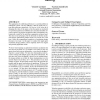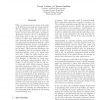67 search results - page 5 / 14 » A Computational Study of the Kemeny Rule for Preference Aggr... |
ACMICEC
2003
ACM
14 years 22 days ago
2003
ACM
The aggregation of conflicting preferences is a central problem in multiagent systems. The key difficulty is that the agents may report their preferences insincerely. Mechanism ...
SIGECOM
2004
ACM
14 years 27 days ago
2004
ACM
Often, an outcome must be chosen on the basis of the preferences reported by a group of agents. The key difficulty is that the agents may report their preferences insincerely to m...
ICDE
1999
IEEE
14 years 8 months ago
1999
IEEE
The ability to model the temporal dimension is essential to many applications. Furthermore, the rate of increase in database size and response time requirements has outpaced advan...
GROUP
2009
ACM
14 years 2 months ago
2009
ACM
Scientific peer review, open source software development, wikis, and other domains use distributed review to improve quality of created content by providing feedback to the work�...
SIGECOM
2003
ACM
14 years 22 days ago
2003
ACM
Often, an outcome must be chosen on the basis of the preferences reported by a group of agents. The key difficulty is that the agents may report their preferences insincerely to m...


